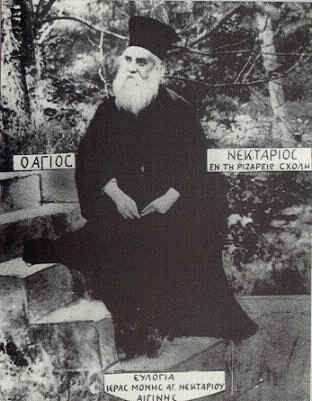"Trust in the LORD with all your heart,
And lean not on your own understanding;"
Proverbs 3:5
"Assuredly, I say to you, whoever does not receive the kingdom of God as a little child will by no means enter it."
Luke 18:17
 |
| Saint Nektarios of Aegina |
The Gospel in action.
This is the easiest ways for me to explain saints and the honor shown them in the Orthodox Church. They exemplify the christian struggle and way of life and are glorified by God as true role models of the faith.
The following story really epitomizes faith in the Lord's provision for me and I thought i would share it. It also contrasts nicely the earthly mindset (in the person of Costas) with the heavenly one (Nektarios).
" Nektarios found himself pulled in different directions. He wanted to send a manuscript of Antiochos the Monk's Soul Saving Book to Mr. Paraskevas, his printer. He had not found the time before and wanted to finally do it this year. However, with his concern about his poor girl students who were now living in Aegina on the one hand and the poor and destitute who sought his help on the other, he hesitated to take on any other debts.
The girls who were now in Aegina had found two rooms with low ceilings across from the Church of Zoodochos Pighi to shield them from the wind and rain. They shared them with a few old natives of the island. They were, Aphrodite Mourtzinos, Eutychia Peppas, and Philio Logiotidis. They all slept together on rag carpets on the floor, and they sustained themselves on legumes and dandelion greens. Although shielded from the elements, there was no escape from the cold and dampness. Nektarios was aware of the girl's living conditions and always saved some money for them. However, he did not know how he could possibly turn away some of the poor people that came to him when there was not enough money. He worried, but had faith.
He was always sought out by those who were desperate, because his reputation was such that they knew they could depend on him. One day for instance, someone came to his office. His overcoat was old and worn, his pants donned patch after patch, and he was pale, skinny and unshaven.
"Your Eminence, I hope you forgive me, but I had to tell the doorman that I was a relative of yours in order to get in."
"You didn't have to lie. I will gladly see anyone who asks. What is the matter?"
"I owe someone twenty-five drachmas. I signed a note and if I don't pay it back by tomorrow morning at ten, I will be thrown in jail. I promise you that I don't even have a penny not even for food."
Nektarios looked at the man, shook his head and summoned Costas Sakkopoulos.
"Costas, give this brother twenty-five drachmas please."
Costas mouth dropped.
"Is there something you wish to tell me Costas?"
"I don't have any money, Your Eminence."
"Please look again. There is great need."
Costas approached Nektarios and whispered in his ear.
"All we have are twenty-five drachmas and it is only the beginning of the month, if you know what I mean."
"Give them Costas, and God will provide."
Costas' eyes glared and he turned to the visitor with wrath.
"And from where did you spring up at this hour?" he said.
"Calm down Costas," Nektarios said calmly. "Do not worry so much. Every help we offer our neighbors will be rewarded. Often, we are rewarded greatly in return, for now a Christian brother is in need and we must help him."
Costas left to get the money and came back grumbling to himself. He gave the visitor the money. That very afternoon, Costas found himself in shock over the reality of the bountiful return Nektarios told him about. Nektarios received an invitation from Archbishop Theokletos to perform the wedding ceremony of a distinguished, wealthy couple at the cathedral. The Rizarios (Seminary) students were also going to chant at the ceremony, for they were a most melodious group. They were offered one hundred and twenty drachmas for their services, one hundred were meant for the bishop (Nektarios) and twenty for the students, who naturally turned them over to Nektarios.
"Nektarios words are profound," Costas kept whispering to himself all night.
"They are indeed inspired by great faith. "
May we all strive for simple childlike faith like this.
Taken from "Saint Nektarios: The Saint of our Century" by Sotos Chondropoulos p.180-181




